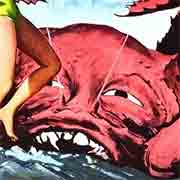|
I can't imagine the torpedoes of the period were exactly reliable munitions. What was the doctrine regarding deck guns? Pop them at the waterline?
|
|
|
|

|
| # ? Jun 10, 2024 03:14 |
|
EvanSchenck, thanks for a great write-up on the true cause of the Civil War: slavery. I agree 100% with you, and yes, Lies My Teacher Told Me is a great book. The section about Helen Keller really blew my mind. What MadDogMike and I were discussing was not the cause of the Civil War but rather the attitudes of most Northerners. We believe that, though most Northerners opposed slavery, very few believed in racial equality. There's a difference between saying "that person should not be property," and saying "that person is my equal." Or even "That person is allowed within 100 miles of my family." I think a large part of Unionists would have agreed to the first statement but not the last two.
|
|
|
|
Frostwerks posted:I can't imagine the torpedoes of the period were exactly reliable munitions. What was the doctrine regarding deck guns? Pop them at the waterline? Well, it depends. Japanese torpedoes were usually pretty reliable, and they managed to kill a LOT of ships with the Long Lance. American Torps, on the other hand... (These are both from the old GBS history thread.) gradenko_2000 posted:I could write a book on faulty WW2 torpedoes. Phanatic posted:It's amazing to me that nobody went to jail over how awful American torpedoes were in WWII. The air-dropped Mark 13 mentioned above was consistently miserable until late in the war; one exercise in 1941 dropped 10 torpedoes, only one of which worked properly (four out of the ten just sank). A survey done in 1943 found that of 105 dropped at speeds > 150 knots, only 31% worked properly; 36% of them didn't even run. And the Mark 13 wasn't the worst torpedo.
|
|
|
|
Bagheera posted:What MadDogMike and I were discussing was not the cause of the Civil War but rather the attitudes of most Northerners. We believe that, though most Northerners opposed slavery, very few believed in racial equality. There's a difference between saying "that person should not be property," and saying "that person is my equal." Or even "That person is allowed within 100 miles of my family." I think a large part of Unionists would have agreed to the first statement but not the last two. I've never understood why this is even an issue considering that the number of white people who thought anyone was their equal could be counted with the fingers and tones of one guy back then. And it's not like this was a white people issue either, the Chinese for example were insane xenophobic. And the South managed to make them still look crazy tolerant because they wanted to OWN PEOPLE.
|
|
|
|
It's important because for a number of reasons. Just off the top of my head: -It kept the Union from using black soldiers for much of the war -It made anti-slavery acts like the Emancipation Proclamation so contentious that it nearly lost Lincoln the presidency in the 1864 election -The Union had to bend over backwards to keep certain states from withholding troops and war material because of anger at anti-slavery acts, primarily in areas like Illinois. Class Warcraft fucked around with this message at 16:44 on Apr 4, 2012 |
|
|
|
Silent Victory by Clay Blair has a lot about the torpedo debacle, you can really get a feel on how frustrated the captains and crew were from apparent misses, duds and blaming from superiors in the log excerpts.
|
|
|
|
Acebuckeye13 posted:Well, it depends. Japanese torpedoes were usually pretty reliable, and they managed to kill a LOT of ships with the Long Lance. A lot of Japanese ships as well, not just Allied ones. Their pure oxygen design meant that while the range was about 4 times that of American Mark 14s, they were also very explodey at the slightest hint of battle damage.
|
|
|
|
gradenko_2000 posted:A lot of Japanese ships as well, not just Allied ones. Their pure oxygen design meant that while the range was about 4 times that of American Mark 14s, they were also very explodey at the slightest hint of battle damage. Yeah, somebody on the Matrix Games forums did a count and more Japanese cruisers were sank by Long Lances detonating on board than American cruisers were sank by getting hit by them. Of course, that's just one class of ship, and overall the Americans lost other ships to them, but it paints a picture. Edit: The long range wasn't super useful either. Working off memory here, but most LL kills were at short range at night, when any decent torpedo could have done the job. They never hit when they tried the long range shots.
|
|
|
|
EvanSchenck posted:
Well, the problem lies in the mixing up of anti-slavery versus abolitionism. One of the unfortunate side effects of Lost Cause mythology being so thoroughly debunked is an assumption that the Republican Party was an abolitionist party. It was not the case at all. Had it been so it would never have attracted a large enough voting base necessary to win national offices. Anti-slavery sentiment had more to do with the fear of the "Slave Power" dominating national politics. The "Slave Power" referred to the belief in a Southern conspiracy of sorts was dominating national politics in a selfish bid to ensure slavery's future at the cost of everything else. And to be fair, their is some truth to this, especially in the Buchanan administration. But, empathy over the plight of slaves was not a rallying call except for a loud, but small portion of northern voters. By contrast, Abolitionists took pride int heir belief that it was the evils of slavery that motivated their actions, and not fears of slavery destroying the free labor system or dominating politics. Abolitionists were very important in shaping popular attitudes, but sadly their empathy never reached the public at large. That's not to say that the ideology of the Republican Party remained unchanged through the war. The battle between Congress and Lincoln over Reconstruction policies illustrate the growing strength of the radical wing. Regardless though, abolitionists remained a minority within the party for the war's duration. There were Republican abolitionists, and abolitionists who saw the Republican Party as sluggish on the issue, but its a mistake to make this group serve as a representative sample of society as a whole. Its wish fulfillment to imagine the North in this way. Immigrant groups and factory labor were terrified of a potential influx of free blacks taking their jobs. Lets not forget the lynchings during the New York Draft Riots, which had less to do with he North's fairly lenient draft than in anger at even believing for one moment that emancipation was a goal. The Republican Party was not immune to racial prejudices and, at Lincoln's behest, sought to win the votes of War Democrats and a potential base of white Southern Unionists; both groups who despite hating the Confederacy, were opposed to speedy emancipation. The Confederate States seceded because they felt that a prohibition in Slavery's expansion (the Republicans were not calling for emancipation yet) was a sign that the institution could not safely continue in the U.S. But, the United States did not go to war over slavery, but to prevent the dissolution of their nation. Northerners believed their nation to be an example to the world of the republican form of government, and felt that the CSA seceding would send a death knell to democracy. Leaving a nation due to simply losing an election threatened the ability to actually enact any form of legislation. Furthermore, the Planter Aristocracy were already felt, and rightly felt, to be anti-democratic enemies of the growing class of wage laborers. Gary Gallagher in "The Union War" does a good job covering this. Abolitionists made up only a fraction of Union armies, and many of these became abolitionists during the war and were not prior. Emancipation as policy needs to be seen in its war time context, given how the US High Command realized that slavery was the cornerstone of the CSA. Moral beliefs on slavery's evils were present, but it took war time justification to bring aboard most of a skeptical population on the issue. Apologies for the long post, and no offense intended, but the over simplification of Northern attitudes on slavery is becoming increasingly problematic. The Lost Cause Theory of the war is garbage, very interesting garbage to study though, but we can't replace it with an over cheerful view of the North that has no basis in reality. When Abolitionism is distinguished from generic, moderate anti-slavery sentiment, it becomes much easier to understand why the North abandoned freed people in the South at Reconstruction's close. It also helps make sense of national efforts of reconciliation later in the century, which as a process swept the contributions of African-Americans in the war under the rug. Black Union veterans were barred from veteran celebrations and leading politicians such as Theodore Roosevelt among others openly questioned whether the 14th and 15th Amendments were worth passing, a pretty good sign at how the white South truly won the aftermath of the Civil War.
|
|
|
|
DarkCrawler posted:I've never understood why this is even an issue considering that the number of white people who thought anyone was their equal could be counted with the fingers and tones of one guy back then. And it's not like this was a white people issue either, the Chinese for example were insane xenophobic. I think it's a Northern myth that's even more persistent than the Southern myth. The Southern myth--that the war was fought for personal liberty and state's rights--has been largely discredited among the general public. There's a corresponding Northern myth, however, that I think the general public largely believes. This is the myth that Northerners were truly egalitarian and welcomed freed blacks with open arms. From reading popular news sites, movies, and various comments, that idea is pretty entrenched in our culture. I think it's important that we disprove that Northern myth just as we disproved the Southern one. Edit: Marlow is much more eloquent than I am. Bagheera fucked around with this message at 00:14 on Apr 5, 2012 |
|
|
|
Marlows posted:Apologies for the long post, and no offense intended, but the over simplification of Northern attitudes on slavery is becoming increasingly problematic. Is it? In my post I cited Loewen to support the contention that the history of the American Civil War was rewritten around the 1910s-20s to whitewash the Confederacy. It would be prudent for you to similar cite something in support of the above. I honestly don't think it's common enough to be a real problem. Everything you're saying is very well established historically, to the point that it is quite uncontroversial, and it's all taught in schools--that the Republican Party was anti-slavery but not abolitionist, that both sides were racists, that the emancipation proclamation didn't free the slaves in the border states, and so on. This is the problem that I have with this whole line of argument. It isn't really even an argument, because for that you'd need another side to it, and nobody actually says that the Republican Party was abolitionist and the Union fought to make African Americans equal to whites. It's possible that a random sampling of Americans would find some proportion are mistaken about this, but that would true of any historical event, even relatively recent ones. For this reason it seems to me that it's less of a real historical argument and more of a tactic to point the finger at the North and say, "you, too, were racists" as a way of deflecting some of the shame that adheres to the Southern cause.
|
|
|
|
I wonder whether the war actually sped up the abolition of slavery in America. If Lincoln got his way and the southern slave owners were marginalized as the rest of the country moved on and developed without slavery. At best, the old South would have a bit of an agrarian economic advantage, since I don't think it was too feasible to use slaves in factories. In a best case scenario, I suppose the institution of slavery would dwindle as more abolitionists cropped up in the free states and more and more elaborate attempts at freeing slaves were developed by the underground. There might have then been less violence as what little remained of slavery was squashed out of existence. Of course, that would've also meant more tension between Great Britain and the U.S., actual laws giving equality would've taken even more time to get out, and with the blacks still very clearly being in an "inferior" place in American society, Nazism would've had a lot more of a following among Americans and it may have been more probable that we'd side with Germany. It's worth noting that the U.S. faced a somewhat unique problem on the slave front, since although picking cotton sucked, it was much easier than harvesting sugarcane. Sugar plantations never managed to build self-sustaining slave populations like the U.S. did, so after Great Britain banned the slave trade, that was about it for them (aside from smuggling).
|
|
|
|
SlothfulCobra posted:I wonder whether the war actually sped up the abolition of slavery in America. Yes, it did. The Southern states went so far as keeping Lincoln off their ballots entirely because they found the possibility of an abolitionist being elected intolerable. The South had no interest in allowing slavery to wither on the vine and had spent the past sixty years obstructing anything that might even hypothetically endanger slavery as an institution. I can't see it ending any other way that it did. Vincent Van Goatse fucked around with this message at 02:28 on Apr 5, 2012 |
|
|
|
SlothfulCobra posted:I wonder whether the war actually sped up the abolition of slavery in America. To understand the answer to this question you really have to understand what the antebellum south was like from a sociopolitical perspective. It was, for all intents and purposes, something similar to the manorial system from medieval Europe. The lords were the landed gentry, they carried practically all of the political and economic power in the south, and at the same time they were the people who stood to lose the most if slavery went away (other than the slave traders I guess). The vast majority of the southern population were yeoman farmers, just like in the north, but they were completely marginalized both politically and economically. I think that if they'd had more power that abolition would have gained more traction in the south (they stood to gain almost as much from abolition as the slaves did), but the only voices that mattered were those of the planters, the top percent wealth-wise or so of the population. Of course it was the yeomen farmers who went off to die in obscene numbers in the war while the planters and their kids stayed home to watch the slaves.
|
|
|
|
I do know that the southerners had set up some kind of new aristocracy that has for the most part dissolved by the modern day. These days it seems like the "southern" ideology is based more on eschewing any trappings of being high class and appealing to the "common" man. I guess any remnant of the old southern ways would have to be isolated in some small town that stayed still while the rest of the world moved on.
|
|
|
|
I had a professor that speaks with an accent that sounds like he belongs on a plantation somewhere, even looks like an old southern gentleman. I wonder where it's from? I've lived almost my entire life in the south and I've only very rarely heard it. That's where his similarities with the old south end though, he was pretty harsh towards the CSA when he covered it, and extremely anti-slavery.
|
|
|
|
SlothfulCobra posted:I do know that the southerners had set up some kind of new aristocracy that has for the most part dissolved by the modern day. These days it seems like the "southern" ideology is based more on eschewing any trappings of being high class and appealing to the "common" man. This has to do with the way the plantation economy was structured. In the antebellum South most capital was held in form of real estate and slaves, neither of which were very liquid commodities. Even wealthy Southerners tended to be cash-poor and lived mainly on credit. i.e. a planter would buy manufactured goods from merchants by borrowing against his next cotton crop, never actually having much cash on hand but able to maintain a comfortable lifestyle. Best of all, since the work was done by slaves, and the slaves were supervised by hired whites, the planter himself did not have to work beyond a very minimal level and could pursue an aristocratic lifestyle. This economic system is one of the reasons that industry and transportation infrastructure in the South was so undeveloped, as people with the means to invest their income had no reason to make improvements of that kind and sank it into land and slaves instead. This was also the source of North-South antagonism over tariffs; in the 19th century tariffs were the primary source of federal income, and deficit spending was much more complicated with currency backed by precious metals. Government spending essentially meant higher tariffs. Northern entrepreneurial society was fine with this both coming and going, because it would allow the government to invest in railroads and canals that would benefit industry, and tariffs raised the price of foreign goods, making domestic manufacture more competitive. Conversely the Southern agrarian society accrued little benefit from investments because most of their transportation being based on existing rivers, and their main economic activity was selling cotton to Britain and buying British manufactures and luxury goods with their profits (usually on the credit scheme described above). They naturally opposed tariffs. The Civil War gutted the economic system of the South. Ordinary smallholders had generally not been prosperous beforehand, but after spending years at war, many coming back maimed or not coming back at all, and with the disruption caused by a war that was fought predominantly on Confederate territory, they were even worse off. In some ways planters could be worse off. Most obviously, slavery had been abolished without compensation to the former owners, so wealth in form of slaves simply evaporated--this represented an immense monetary setback. The loss of the labor force also meant that their remaining wealth, land, was dramatically devalued. Some equilibrium was eventually restored by returning freed slaves to their former economic role through the sharecropping and penal labor systems, but the easygoing planter lifestyle had taken a severe blow. The political dominance of this class was also severely eroded, because they were identified as the party most responsible for the Civil War. More significantly, over the course of several boom-and-bust cycles, the USA's economy grew enormously between 1870 and 1920. Most of this economic growth came from the expansion of industry and was heavily biased towards urban centers in the north. The South only began to catch up to the North in this regard after WWII. Even to this day, income levels and related statistics in most of the Southeastern US remain below the national average. Naturally, this finds expression in culture. Schenck v. U.S. fucked around with this message at 05:17 on Apr 5, 2012 |
|
|
|
Mustang posted:I had a professor that speaks with an accent that sounds like he belongs on a plantation somewhere, even looks like an old southern gentleman. I wonder where it's from? I've lived almost my entire life in the south and I've only very rarely heard it. That's where his similarities with the old south end though, he was pretty harsh towards the CSA when he covered it, and extremely anti-slavery. I'm betting this was the "Piedmont" accent, sort of like what this buffoon has. I'm not positive on this but I remember hearing once that most wealthy American planters, regardless of where they lived, spoke like this as they were all essentially descended from the same groups of people. When I was looking for that video I found this one which is both beautiful and tragic.
|
|
|
|
Marlows posted:Well, the problem lies in the mixing up of anti-slavery versus abolitionism. One of the unfortunate side effects of Lost Cause mythology being so thoroughly debunked is an assumption that the Republican Party was an abolitionist party. It was not the case at all. Had it been so it would never have attracted a large enough voting base necessary to win national offices. Anti-slavery sentiment had more to do with the fear of the "Slave Power" dominating national politics. The "Slave Power" referred to the belief in a Southern conspiracy of sorts was dominating national politics in a selfish bid to ensure slavery's future at the cost of everything else. And to be fair, their is some truth to this, especially in the Buchanan administration. But, empathy over the plight of slaves was not a rallying call except for a loud, but small portion of northern voters. By contrast, Abolitionists took pride int heir belief that it was the evils of slavery that motivated their actions, and not fears of slavery destroying the free labor system or dominating politics. Abolitionists were very important in shaping popular attitudes, but sadly their empathy never reached the public at large. I think you are underselling some of the Northern politicians, particularly post-War. Pre-war, certainly, 'free soil' had as much to do with the economic competition provided by slave labor, and equality was never really a goal, but an end to brutality and inhumanity was certainly part of the discourse, and one the South found particularly worrying, often seeking to silence Northern presses. Additionally, in that forgotten decade or so after the war there is an incredible pursuit by the Reconstruction government to effect change and right wrongs. A simply economic objection to slavery simply does not explain the, say repeated attempts by the Republican Congress to pass equal rights bills and amendments over vetoes from the president, even to the point of provoking him into violating a BS law they'd enacted (over Johnson's veto) to keep Lincoln appointed Radicals in Cabinet positions, particularly Edward Stanton, the Secretary of War and the man in charge of enforcing the (congressional mandated over Johnson's veto) martial law. Impeachment passed, and three times Congress failed to convict by just one vote. Within 6 years of the 1860 election Congress (well the Senate) was one vote away from a legislative coup d'état because Johnson didn't want to play ball not on abolition but on voting rights and the Freedman's Bureau. Because the vote needed 2/3rds majority to pass, that's a 35-19 split in FAVOR of removing Johnson. This is within two, three elections of the start of the war, less than that for the Senate. You also have to remember that a lot of the Republican positions pre-War were short of spectacular, but they were also drafted in a situation in which war was not seen as necessarily inevitable and in which no one wanted to be see as the uncompromising dicks who started it by being idiots. There was a tradition of grand compromises utterly alien to today's politics, but you have to remember that one of the 3rd parties that fractured the 1860 election was the 'hey let's not go crazy and secede/force anyone to secede' party. They won whole states. It was a complicated mess, but there were definitely factions in the North a lot more gung ho on 'equality' than are given credit.
|
|
|
|
quote:US wolfpacks I just read the memoirs of a US submariner operating out of Australia and he said they tried to emulate the wolfpacks with three subs working together but it was hard to coordinate attacks., edit: http://www.amazon.com/War-Boats-Submarine-Battles-Memories/dp/1574887343/ref=sr_1_5?ie=UTF8&qid=1333657695&sr=8-5#_ Trench_Rat fucked around with this message at 21:29 on Apr 5, 2012 |
|
|
|
How did the armies of the Carolingian Empire compare to the Roman legions? Were the dark ages truly a step back as far as tactics and equipment were concerned, or was it more of a stagnation? Related, can anyone recommend some good reading on the franks, or really anything contemporaneous?
|
|
|
|
I think you'd have to compare the Carolingians to the Germans, really. Since that's what they were. The dark ages was a wonderful time to be a German, since there was nothing but progress for them.
|
|
|
|
shezihka posted:How did the armies of the Carolingian Empire compare to the Roman legions? Were the dark ages truly a step back as far as tactics and equipment were concerned, or was it more of a stagnation? Tactics and equipment used by the Carolingians would have been familiar to late Romans in many ways, but were quite different from the professional legions of the Republican and Early Imperial eras. During the very, very long "fall of Rome," the military had changed from relying on a core of disciplined, well-trained Roman or heavily Romanized troops to heavy use of auxiliaries from barbarian tribes or puppet states. Cavalry was used more heavily, swords got longer, drill got poorer. After the fall, the Empire fractures and professionalism goes out the window. Then Charles Martel, Charlemagne's grandpappy, created/adopted the newfangled feudal system, raised a bunch of money from his vassals and churches, and established the first standing professional army in Western Europe since the fall of Rome, relying on the time-honored European tradition of heavy infantry. We're not quite to the total dominance of heavy cavalry, but we're only about a century away when Charlemagne is in power. The equipment of a professional Carolingian soldier would be similar to his late Roman forebears: his primary weapon would be a long spear, which replaced the legionnaire's pilum in the late period, and he would have carried a sword, closer to a spatha in length than the earlier gladius. His helmet would have been simpler than that of an early imperial legionnaire, but still useful. If he had armor, it would probably be chain mail. His equipment would not be as uniform as those of the Romans, as the empire is no longer financing mass-production. I don't know poo poo about the Frankish throwing axe, so if someone else has details, please share, as it is a piece of equipment not used by the Romans. I think at this point it's out of use by the Franks, though. I wouldn't say the Dark Ages were a step back in tactics and equipment, just a different environment. Instead of a single, large, dominant state, there are many smaller groups led by warlords. War in Western Europe changed from that of large-scale conquest with large standing armies to more localized affairs. In fact, in some ways technology got better. Improved metallurgy made crafting longer swords easier, stirrups arrived, new designs in fortifications, etc. If anybody has more answers, or any corrections, go for it. I'm no expert on the Carolingians, and I know more about Rome and the ancient world. SlothfulCobra posted:I think you'd have to compare the Carolingians to the Germans, really. Since that's what they were. SlothfulCobra posted:The dark ages was a wonderful time to be a German, since there was nothing but progress for them. e: repeated words. FishFood fucked around with this message at 00:32 on Apr 6, 2012 |
|
|
|
SlothfulCobra posted:I think you'd have to compare the Carolingians to the Germans, really. Since that's what they were. By the time the Western Empire fell you would have had trouble distinguishing the invading German armies from the Roman legions. The Merovingian and then Carolingian armies utilized sophisticated Roman seige tactics at the very least including the use of catapults. According to this book: http://books.google.com/books?id=0X...olution&f=false The Carolingians were straight up reading and copying old Roman tactical treatises. The book Epitome of Military Science by the late Roman author Vegitius was frequently copied by 8 and 9th century monks and many of its tactics may have been adopted by the Carolingians to defend against Viking and Magyar raiders. As far as I know Frankish throwing axes were totally abandoned by the time the Carolingians came to power. While their armies did fight primarily as infantry, they often deployed mounted and only dismounted before battle.
|
|
|
|
Squalid posted:While their armies did fight primarily as infantry, they often deployed mounted and only dismounted before battle.
|
|
|
|
shezihka posted:If they have enough horses to ride to the battlefield, why wouldn't they fight mounted? For most of the Carolingian period, stirrups hadn't reached Western Europe and heavy infantry were still dominant. Infantry are a lot more flexible, and can be used offensively and defensively, while cavalry are better used on offense. Mounted infantry combine some of the strengths of both types of soldier; you get the flexibility of infantry and the mobility of cavalry.
|
|
|
|
FishFood posted:I wouldn't say the Dark Ages were a step back in tactics and equipment, just a different environment. Instead of a single, large, dominant state, there are many smaller groups led by warlords. War in Western Europe changed from that of large-scale conquest with large standing armies to more localized affairs. In fact, in some ways technology got better. Improved metallurgy made crafting longer swords easier, stirrups arrived, new designs in fortifications, etc. I'd say there was a definite drop in tactics and equipment, at least from the early to mid Empire. You are dead on with the late empire stuff, but if you were to transport Martel and his army back to 100 and duke it out with Rome, Rome wins. They had more and better generals, hundreds of years of documented military experience, and better equipment. Roman logistics alone would basically beat any other army until those tech advances you mentioned started cropping up, which was when, like 900-1000? The much, much reduced economies meant that even as some little pockets of tech were developed, the overall European landscape took until 1300 or so to start matching the infrastructure it had under the Empire.
|
|
|
|
shezihka posted:If they have enough horses to ride to the battlefield, why wouldn't they fight mounted? There is also the quality of horseflesh to consider, small manuverable horses just arn't good for charging. The development of the knight and other heavy charge cavarly was accompanied by the breeding of better and better horses. Actually one of the effects of the fall of Rome was the breaking up of the horse breeding programs, meaning alot of poorer quality horseflesh got bred into the lines. Even early Norman horses were still quite small.
|
|
|
|
WoodrowSkillson posted:I'd say there was a definite drop in tactics and equipment, at least from the early to mid Empire. You are dead on with the late empire stuff, but if you were to transport Martel and his army back to 100 and duke it out with Rome, Rome wins. They had more and better generals, hundreds of years of documented military experience, and better equipment. Roman logistics alone would basically beat any other army until those tech advances you mentioned started cropping up, which was when, like 900-1000? The much, much reduced economies meant that even as some little pockets of tech were developed, the overall European landscape took until 1300 or so to start matching the infrastructure it had under the Empire. There wasn't a drop in tactics and equipment, there was an adaptation to a new world. The reason why the Legions were so good was because they literally had all of the Mediterranean and trade with the far east to finance them. When the Empire split the western part lost all of it's far east trade and it's Greek, Syrian and Egiptian cities while receiving under-developed Gaulish cities. Sure, they had the Iberian mines, but that didn't serve for much other than to sustain the armies they had. This has been said before and i'll say it again, you can't say "well take Martel back to Rome's prime and he'll be beaten There's also the fact that the armies of the Eastern Empire didn't change much to their army form, other than the necessary changes to make them loyal and the changes from them to the "classical Legions" were minimal. The fact that they were (slowly) beaten and (slowly) conquered shows that the Legions weren't the perfect sex machine you so adamantly defend. Rabhadh posted:There is also the quality of horseflesh to consider, small manuverable horses just arn't good for charging. The development of the knight and other heavy charge cavarly was accompanied by the breeding of better and better horses. Actually one of the effects of the fall of Rome was the breaking up of the horse breeding programs, meaning alot of poorer quality horseflesh got bred into the lines. Even early Norman horses were still quite small. Mans fucked around with this message at 16:54 on Apr 6, 2012 |
|
|
|
This is a bit off topic (:economics:), but deals with the Romans conquering Dacia. Roman GDP from what I've seen put it at around $10 bn. Next, I read that the Romans looted 135,000 kg of gold alone - equivalent to nearly $8 bn - from Dacia from the 2nd Roman-Dacian War. I assume most of this went to helping fund the military, but did it lead to a rapid increase in expansion and how would the Roman economy have been affected by having that influx of gold, not including the ~400k kg of silver?
|
|
|
|
Iseeyouseemeseeyou posted:how would the Roman economy have been affected by having that influx of gold, not including the ~400k kg of silver? I don't know what happened in that particular circumstance, but an increase in your monetary supply about the size of your entire economy is going to give you some pretty awful inflation.
|
|
|
|
It probably wouldn't have been put into the M0 supply (currency in circulation) right away and at the same time though.
|
|
|
|
The entire Roman economy was extremely dysfunctional and so was state control of it. Basically take all the problems inherent in an aristocratic slave-owning society (that we can see from the American South) and then pump them up to the max with a 'winner takes all' political system where corruption is so extravagant that you have to be this guy before anyone can even think of touching you.
|
|
|
|
On the topic of stirrups, I can't fathom how it took 4000-5000 years of riding horses until someone came up with the idea of a stirrup. It's just a loop on the saddle
|
|
|
|
IM_DA_DECIDER posted:On the topic of stirrups, I can't fathom how it took 4000-5000 years of riding horses until someone came up with the idea of a stirrup. It's just a loop on the saddle But it took that ~4k years to develop a saddle, first, then some centuries to come up with a stirrup. I'm no brony expert, but the first "saddles" must have been rather pitiful by our standards. Think of a blanket on the horse's back with no belt. What good would a stirrup have been? I believe what happened was a gradual evolution toward a type of saddle where stirrups were applicable, and only then would the concept actually make any sense!
|
|
|
|
Also I believe stirrups existed for quite some time in Asia before they were ever used in Europe. I don't think it was nearly 4000 years from the time that horses were used in a big way until the invention of the stirrup there.
|
|
|
|
IM_DA_DECIDER posted:On the topic of stirrups, I can't fathom how it took 4000-5000 years of riding horses until someone came up with the idea of a stirrup. It's just a loop on the saddle It depends on how the horses were used. If you're using your horses mostly for transport and scouting/raiding, not heavy combat, then you just don't need stirrups as much as you think. Stirrups keep the rider steady in the saddle, making him more effective at mounted combat. If your horses are small and quite skittish, as horses were for many thousands of years until they were bred to be larger, then the mounted knightly combat we all love isn't what you have in mind for your horses and so stirrups don't seem so essential. Stirrups are a great improvment but not really revolutionary.
|
|
|
|
What was the largest surrender in military history by number of troops? Google isn't giving an answer.
|
|
|
|
Farecoal posted:What was the largest surrender in military history by number of troops? Google isn't giving an answer.
|
|
|
|

|
| # ? Jun 10, 2024 03:14 |
|
Farecoal posted:What was the largest surrender in military history by number of troops? Google isn't giving an answer. It depends on what you mean by 'surrender' and for that matter 'troops'. Almost every able-bodied Japanese was actively supporting the war effort in WWII, and they were preparing to fight with whatever they had if the Allies invaded the home islands. I would have to say that counts, even 'just' the entire regular Japanese military was the largest mass surrender.
|
|
|





































